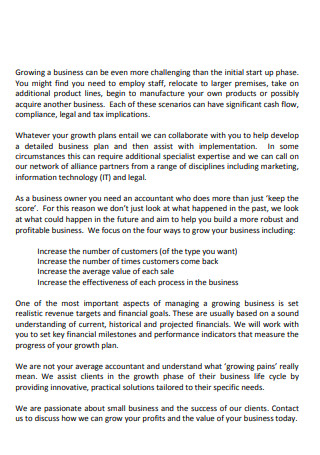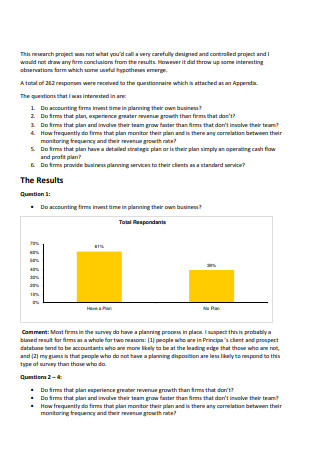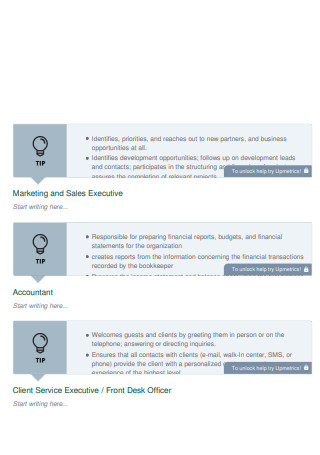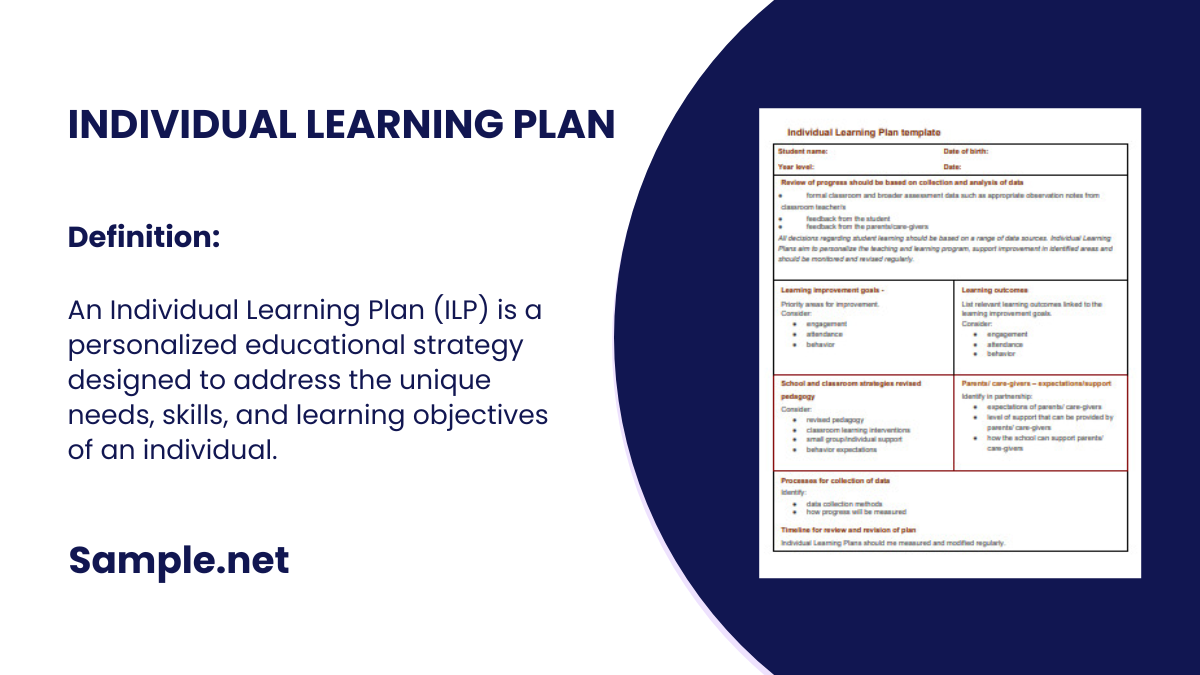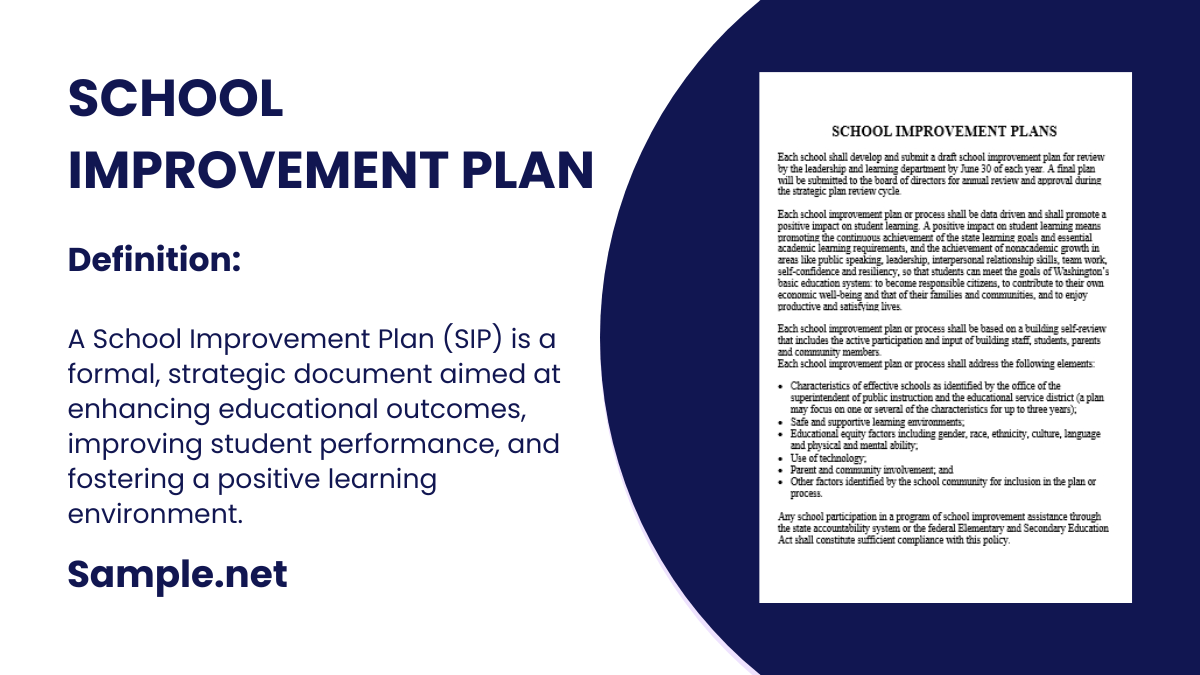An Individual Learning Plan (ILP) is a personalized educational strategy designed to address the unique needs, skills, and learning objectives of an individual. It serves as a roadmap for…
continue reading
3+ SAMPLE Accountancy Firm Business Plan
What Is an Accountancy Firm Business Plan?
A business plan for an accounting company is a composed document that outlines the company’s primary activities, objectives, and strategies for achieving those objectives. An executive summary, goods and services, marketing strategy, financial planning, and a budget should be included in a solid company plan. According to statistics, there are now 1,076,179 accountants working in the United States. Women accountants for 57.0%, while males accountants for 37.1%.
Benefits of Hiring an Accounting Firm
Outsourcing any service has several benefits. Unsurprisingly, today’s trend is to outsource services to reputable organizations and firms. As you can see, accounting companies are frequently recruited to provide clients with accounting services. Nonetheless, individuals prefer to use in-house accountants over outsourcing services to a reputable firm. Why is this the case? This is a more subjective question. Some people will assert that they lack trust in accounting businesses; others will argue that they are overcharged for services, and so forth. If you continue to be concerned about such issues, you risk jeopardizing your business’s productivity. If you wish to avoid future losses, you must select a reputable accounting firm. Does that not sound convincing? Then read on some reasons to hire an accounting firm.
Tips For Increasing Your Accounting Firm’s Efficiency
Simplifying accounting processes frees up time for new services or customer additions without requiring additional bandwidth. Meanwhile, automating routine administrative tasks like data input and check runs frees up forecasting, problem-solving, and client planning time. Similarly, by providing information on demand, efficiency improves the client experience. The following are some pointers on how to develop an efficient approach.
Types of Accounting
Accountants can pursue a variety of specializations within accounting based on their career interests and objectives. The following are the seven most prevalent styles of accounting:
-
1. Financial accounting
Financial accounting is primarily concerned with compiling data for external financial reports. Financial accountants collaborate with their colleagues and managers to devise strategies for increasing a company’s profitability. Additionally, they keep track of all financial transactions documented in a ledger and ensure that internal procedures are followed and that all financial transactions reflect on pertinent financial statements. Financial accountants typically work with revenues and expenditures, including supervising or participating in general ledger accounting, accounts payable, accounts receivable, payroll audit, grant administration, and fixed asset management. A financial accountant’s primary responsibility will be to accurately document and report financial transactions.
2. Managerial accounting
This type of accounting documents, monitors, and helps with financial planning. They usually write their papers for people inside their company, not the general public. A managerial accountant must be careful about who they tell private information to and how. They work with their managers to figure out the company’s short- and long-term goals, and then they make a budget to meet those needs. Managerial accountants are interested in looking at how things have worked in the past to predict how things will work.
3. Cost accounting
Although cost accounting is a subsection of managerial accounting, the activities of cost accountants affect both financial and administrative accountants. Cost accountants are tasked with recording, presenting, and assessing production costs. They monitor all variable and fixed costs to ensure that output is consistent with the cost of production. Additionally, they collaborate with management to make future decisions based on financial forecasts and production progress. The method of computed unit costs varies between industries and even across comparable businesses. Cost accountants are accountable for adopting, supervising, and providing input on tracking these costs. The allocation of overhead is a significant consideration. While direct materials and labor expenses are easily tracked, indirect costs can be apportioned in various ways, such as those associated with machinery, the building, utilities, and shared staff.
4. Auditing
External auditing is how a business submits financial documents to a third party for economic analysis. In this case, a third party is a credible source for determining whether a company’s financial statement complies with GAAP. An internal auditor can assess employee departmental responsibilities, management policies, and project approval procedures. As a result, they provide valuable feedback that can assist a business in becoming more profitable and efficient. Internal auditors’ qualifications will differ, as this is an internal position.
5. Accounting information systems
Accounting information systems, or AIS, are the software applications used by businesses to collect, store, and process financial and accounting data. Numerous AIS is now integrated with other departments, for example, by connecting the Human Resources hiring process to the payroll function for a newly hired employee. This flow-through technique helps to decrease human data entering. Professionals at AIS are responsible for the continuous enhancement of successful accounting operations. Employees in this profession assess the optimal periods to install new technology and monitor the development of existing systems to evaluate whether or not there has been a gain in productivity over a specified time. They can make decisions in collaboration with the IT department to ensure technology processes remain consistent. Additionally, they frequently assist with technical support related to AIS maintenance, such as adding new accounts in the system or debugging software faults.
6. Forensic accounting
Forensic accounting is used to examine an individual’s or business’s financial records. When certain pieces of financial information are missing or unavailable for inspection, accountants may be required to recreate them. The objective of forensic accounting is to compile all available documentation and account for all transactions in financial statements accurately and comprehensively. These experts are frequently involved in legal matters, including fraud, claims, and disagreements.
7. Governmental accounting
Governmental accountants are responsible for financial planning and resource allocation within a municipal, state, or federal government. This sort of accounting is governed by rules established by the Governmental Accounting Standards Board (GASB), which provides local and state governments with uniform accounting methods. Federal personnel will adhere to the Federal Accounting Standards Advisory Board’s accounting standards (FASAB). Additionally, government accountants will oversee a government’s budget and ensure that monies are allocated effectively.
How To Create an Accountancy Firm Business Plan
Establishing an accounting firm is comparable to starting any other small business in that it requires considerable time and work, which is why a business plan is necessary. A business strategy template for an accounting firm can assist you in laying the groundwork for a well-written and well-structured project. This can be accomplished by choosing one of the excellent templates seen above. If you prefer to write one independently, the following steps will assist you.
-
1. Create a concise executive summary.
Although the executive summary is the top section of a business plan, many business owners write it last after completing the other areas. The executive summary summaries and summarizes the contents of the project. It contains the objectives and mission of your accounting firm and a description of your accounting services and how they differ from those supplied by competitors. The executive summary also includes information on your business’s location, equipment, and personnel.
2. Conduct a market analysis of your industry.
The market analysis section establishes who your clients are based on demographic data such as age, gender, and socioeconomic status. Since accounting services may be provided to businesses and individuals, you can segment your clients according to their size or type of business, such as small business owners or fitness gyms. Once you’ve defined your target, determine the right marketing strategies for them, such as display advertising, tax articles in trade journals they read or networking at local clubs they would join.
3. Describe management and operations in detail.
Create a list of the members of your management team and their titles and duties. Include their education and experience in establishing and operating a profitable accounting practice. Following that, state the daily tasks required to use the accounting firm and who is responsible for ensuring they are executed.
4. Provide financial data about your business.
Create a financial statement for the accounting firm that details the firm’s current and projected costs and revenues for the following year. Provide information about your assets, such as equipment, and your liabilities, such as debts. Describe your approach for managing financial risk and recovering from a catastrophe.
FAQs
How is an accounting business structured?
A partnership, a sole proprietorship, or a public company may form an accounting or financial firm. Entrepreneurs run sole proprietorships, which may employ part-time or seasonal personnel to assist with the workload. The partnership is the most frequent type of finance and accounting organization.
What is the purpose of an accounting firm?
Accounting businesses provide various services to their clients, including accounts payable/receivable, bookkeeping, and payroll processing. They ensure that financial transactions are correct and lawful, and they assist individuals and corporations in interpreting financial statements to determine their financial health.
Is there a demand for accountants?
Accountants and auditors are expected to expand at 7% between 2020 and 2030. Over the next ten years, an average of 135,000 opportunities for accountants and auditors are expected.
A business plan is a composing blueprint for a company’s marketing, financial, and operational objectives. Download our easily modifiable and detailed samples of Accountancy Firm Business Plans today!
